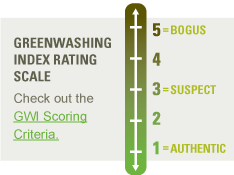Another Green Monday
“More and more of us in the industrialized world are feeling a spiritual void, and coming to believe that moving away from consumerism and towards community may be an important step in recovering that nameless thing we’ve lost.” – Pulitzer Prize winning poet Gary Snyder.
The leftovers are gone. Black Friday passed relatively peacefully. And so did Buy Nothing Day. Last week’s Another Green Monday discussed the pitfalls of “greensumption,” so this edition offers a solution through The Greenwashing Index as readers think about gifts. It’s simple enough: Greenwashing is defined as the practice where a business tries to make it seem like it’s greener than it really is. The site is a place for consumers to post and rank environmental advertisements in the hope of differentiating the misleading ones from the honest. 
Site Goal #1: Help consumers become more savvy about evaluating environmental marketing claims of advertisers. Site Goal #2: Hold businesses accountable to their environmental marketing claims. Site Goal #3:Stimulate the market and demand for sustainable business practices that truly reduce the impact on the environment.
“Our objective here is to push on the greenwashing issue and, by doing that, set an example for the world to see,” said Deborah Morrison, a University of Oregon professor and the site developer.
A while back we actually threw a daily tip about Larry David and water conservation to the fate of their Greenwashing index scale. Scoring a 2.91, the comments ranged from “this is the dumbest thing I’ve ever seen” to “makes a good case for being bald I guess?” See, they’re hard to fool--- consumers and the planet are better off for it.
But going back to the Snyder quote, check out the classic Story Of Stuff. Lasting 20-minutes, it’s a quick and informative look at production and consumption, exposing “the connections between a huge number of environmental and social issues, and calls us together to create a more sustainable and just world. It’ll teach you something, it’ll make you laugh, and it just may change the way you look at all the stuff in your life forever.”
Here are some stories you might’ve missed…
Report from the future Ice Age Floods National Geologic Trail. How can you live in this area and not geek out on the Glacial Lake Missoula Floods? From the Columbia River Gorge to the rolling hills of the Palouse, the great floods of 13 to 15,000 years ago are the single most impressive natural event that this part of the country has ever seen. And in 2016, what you don't know now, you might learn along the Ice Age Floods National Geologic Trail - a trail that "will lead amateur geologists and their longsuffering kin along nearly 1,000 miles of roads, from the floods' origins in Montana to their exit on the Oregon coast." Read more about the trail, about the floods, and about the geologists who know it best HERE.
The pine beetle fight is on. In a bill co-sponsored by Idaho Senator Jim Risch, the U.S. Forest Service would be allowed to identify high-priority areas and expedite analysis of proposed treatments to figh pine beetle infestation that has killed millions of trees in eastern Washington, Idaho, Montana, Oregon, New Mexico, and South Dakota. The bill was introduced by Colorado Senator Mark Udall to fight what he calls one of the biggest natural disasters we face in the West. Read more HERE.
Hopenhagen? Denmark’s first Minister for Climate and Energy weighs in on the talks and she ain’t messing around: “The content of a deal is basically four challenges that need solutions. The deal should involve binding medium and long-term greenhouse gas reduction goals for developed countries. And it should put the big developing economies on a cleaner and greener path to prosperity. Finally it needs to provide assistance for the vulnerable countries -- those who are hit hardest and hit first. The deal must bring new and truly additional finance on the table -- some of which needs to fund adaptation in developing countries -- and an agreement needs to be reached on how we can work together to disseminate and develop technology and knowledge. These are the four cornerstones in Copenhagen that we must deliver on. And solve it we must. We have no alternative. We must handle climate change and we must do it right now. Copenhagen is the deadline. Time is up. Let's get the job done.” Full article HERE.
